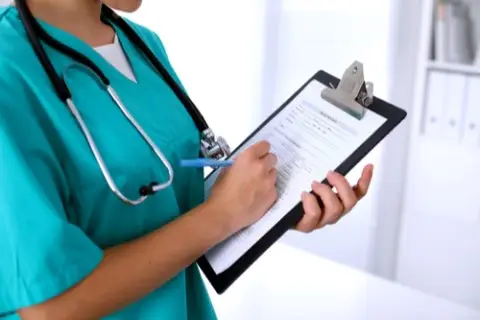
Doctor’s Note for Work After an Injury: What You Need to Know
Recovering from a car accident or work-related injury can be physically, emotionally, and financially stressful—especially when you’re unsure how long you’ll be out of work or what your employer requires for your return. One of the most important tools in this process is a doctor’s note for work.
If you’re searching for guidance on how to obtain one, what it should include, or how it can support your recovery and workplace reentry, you’re in the right place. In this article, we’ll cover everything you need to know—from why a doctor’s note matters to how our providers can evaluate your injury and determine the right timeline for your return to work.
What Is a Doctor’s Note for Work?
A doctor’s note for work, also called a work status letter or medical excuse note, is an official document provided by a licensed healthcare professional. It explains your current medical condition and outlines whether you can work, need accommodations, or should remain off duty for a period of time.
A Doctors Note For Work Can Include:
-
- The date of your evaluation
- Your diagnosis or the nature of the injury (if necessary)
- Work restrictions or limitations (e.g., no lifting, no prolonged standing)
- Estimated time off required for recovery
- Plans for follow-up visits or return-to-work reassessments
This documentation provides legal and medical justification for your time off. It also allows your employer to make informed decisions about how to handle your workload or accommodations under workplace injury policies or ADA guidelines.
Why You Might Need a Doctor’s Note After a Car or Work Accident
Whether you’ve been in a motor vehicle accident or experienced an injury on the job, it’s crucial to understand that your body may not be ready to return to full activity—even if your symptoms seem minor at first.
Injuries we commonly see after car or workplace accidents include:
-
- Whiplash and neck strain
- Lower back pain or herniated discs
- Shoulder injuries and rotator cuff strains
- Joint pain and swelling (knees, wrists, ankles)
- Concussions and mild traumatic brain injuries
- Soft tissue injuries, such as sprains or muscle tears
These conditions may not always be visible, but they can severely limit your physical capabilities and interfere with your job performance. Attempting to return to work too soon can worsen your injury, delay your healing, and even put you at risk for further harm.
This is where a doctor’s note for work becomes not just helpful—but essential.
How Our Providers Help: Evaluation, Treatment & Documentation
At our office, we understand the complexity of accident-related injuries and the stress they place on your daily life. Our team of experienced medical professionals—including chiropractors, physical therapists, and healthcare providers—offers comprehensive evaluations to help determine:
-
- The severity of your injury
- How your injury impacts your ability to work
- Whether it’s appropriate to return to work or remain out
- Any specific job restrictions or modifications you may need
Depending on the nature of your symptoms and your job responsibilities, we may also recommend diagnostic testing such as:
-
- Digital X-rays
- MRI scans
- Range of motion and neurological testing
- Functional assessments
This allows us to create a customized care plan and provide an accurate, medically justified doctor’s note for work that aligns with your recovery.
When Should You Get a Doctor’s Note For Work?
You should request a doctor’s note if:
-
- You’ve missed work due to an accident and your employer requires documentation
- You are unsure whether it’s safe or appropriate to return to work
- You need workplace accommodations (such as light duty or limited hours)
- You are filing a workers’ compensation or disability claim
- Your job involves physical labor or tasks that could worsen your injury
Getting evaluated sooner rather than later is always best. A delay in medical documentation could raise questions with your employer or insurance provider—and may even complicate your benefits or claims.
What Happens During Your Visit
Here’s what to expect when you come in for your evaluation:
1. Detailed History Review
We’ll begin by reviewing the details of your accident, your current symptoms, medical history, and the physical requirements of your job.
2. Comprehensive Physical Examination
This includes orthopedic and neurological tests to assess pain, range of motion, mobility, strength, and nerve function.
3. Diagnostic Testing (if necessary)
We may order or review imaging studies like X-rays or MRIs to get a clearer picture of any internal injuries.
4. Work Ability Assessment
We’ll discuss your specific job duties and determine if you’re physically able to perform them safely. If restrictions are needed (e.g., no heavy lifting, no standing more than 30 minutes at a time), we’ll outline those in your note.
5. Treatment Plan & Documentation
Based on your condition, we may or may not recommend a course of treatment—which may include chiropractic care, physical therapy, medication, or referrals to specialists. We’ll also issue a doctor’s note for work that reflects your medical status and return-to-work timeline.
What If You’re Still Not Ready to Return?
If your injury is severe or your symptoms are ongoing, we may advise an extended recovery period. Our team will:
-
- Provide updated doctor’s notes as needed
- Monitor your progress through follow-up visits
- Adjust your treatment plan based on how you’re healing
- Communicate with your employer or case manager if necessary
We take pride in advocating for our patients—ensuring that return-to-work decisions are made safely, with your long-term health as the top priority.
What Should You Do If Your Employer Questions the Note?
Unfortunately, not all employers understand the nature of accident-related injuries, especially those that aren’t visible. If your doctor’s note is questioned or denied, it’s important to:
-
- Stay calm and provide the documentation
- Ask your employer to put any concerns in writing
- Let us know—our team can provide clarifying documentation or speak directly with your HR department, workers’ comp insurer, or legal representative if needed
Your rights and recovery should be respected, and we’re here to help make sure that happens.
Let Us Help You Get Back on Track—Safely
Navigating life after a car accident or work injury is difficult enough without having to guess when it’s safe to return to work. With proper medical evaluation and documentation, you can make informed decisions that support both your recovery and your responsibilities at work.
Our team is here to help you every step of the way. If you’ve been injured and need a doctor’s note for work, our providers can determine the work limitations, if any, and the amount of time you need to recover.
Call us today to schedule your evaluation, (631) 646-2256 or speak to one of our professionals to learn more about our injury treatment services.
Can I get a doctor’s note without being seen?
No, you typically need to be evaluated by a licensed healthcare provider in order to receive a valid doctor’s note for work. Medical professionals must assess your condition to determine if time off is medically necessary and how long you should remain out. Issuing a note without an evaluation could be considered unethical or even fraudulent. Our office offers thorough, personalized evaluations to ensure your note is both accurate and medically justified.
Do employers actually verify doctor’s notes?
Yes, many employers do verify doctor’s notes—especially in cases involving extended absences or workplace injury claims. While they cannot demand detailed medical information due to privacy laws (like HIPAA), they may contact your provider’s office to confirm the legitimacy of the note, the date of your visit, and the stated work restrictions. That’s why it’s important to obtain your note from a trusted, licensed medical provider like ours.
Is a doctor’s note enough for work?
A doctor’s note is often sufficient for justifying a medical absence and helping you return to work safely. It serves as official documentation of your condition and outlines any restrictions or accommodations you may need. However, in some cases—such as workers’ compensation claims, disability benefits, or FMLA leave—additional paperwork may be required. Our team can help you navigate those situations and provide any follow-up documentation your employer or insurer requests.
Doctors Note For Work – Patient Info Statement
The information provided on this page or article is for informational purposes only and should not be considered as medical advice. The content is not intended to diagnose, treat, or recommend a specific course of treatment for any medical condition. It is designed to help users understand various standards of care and medical conditions. No information on this website establishes a doctor-patient relationship, and it should not be relied upon as a substitute for professional medical advice. Always seek the advice of your physician or qualified healthcare provider with any questions you may have regarding a medical condition or treatment. The prices listed on this webpage relect starting price, the fees incurred may be more than expected and treatment is always based on medically necessity.
